SEO tools for web can help you make your website more visible in search engines and increase the amount of traffic it gets.
There are many different types of SEO tools, which can make it difficult to choose the right one. Some are free while others are paid. If you’re just starting out with SEO and don’t have a lot of money to spend on tools, there are some great free ones out there that will help get your site ranked higher in the SERPs.
If you’re looking for an easy way to get started with SEO or want to find out if your site has any issues that need fixing before you start working on boosting its visibility, these six tools will help:
Seo Tools For Web
1. Ahrefs: SEO Keyword Tool

Ahrefs is one of the most recommended SEO tools online. It’s only second to Google when it comes to being the largest website crawlers. SEO experts can’t get enough of Ahrefs’ Site Audit feature as it’s the best SEO analysis tool around. The tool highlights what parts of your website need improvements to rank better in search engines. From a competitor analysis perspective, you’ll likely use Ahrefs to determine your competitor’s backlinks to use them as a starting point for your own brand. You can also use this SEO tool to find the most linked to content within your niche, check and fix broken links on your website,and get an overview of your best-performing pages (so you can see what information is drawing in the visitors).

Syed Irfan Ajmal, a Growth Marketing Manager at Ridester, loves the SEO keyword tool Ahrefs. He shares, “Ahrefs is surely our most favorite tool when it comes to various facets of SEO such as keyword research, rank tracking, competitor research, SEO audit, viral content research and much more. We add our site and those of our competitors to it. The tool then shows us the sites which have backlinked to our competitors but not us. This helps us find great link opportunities. But this wouldn’t have been so easy if Ahrefs didn’t have the largest database of backlinks. Ahrefs has been instrumental in getting our site ranked for several major keywords, and getting us to 350,000 visitors per month.”
2. Google Search Console: Top SEO Tool
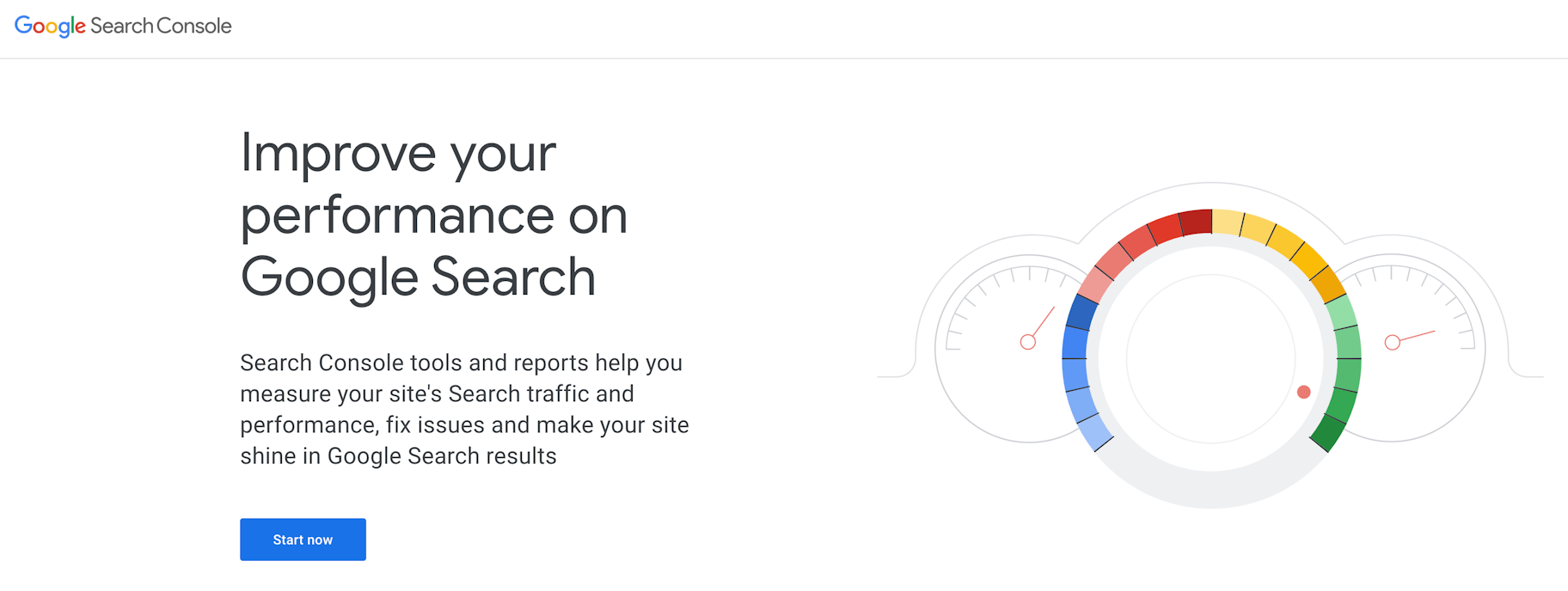
Offered for free to everyone with a website, Google Search Console lets you monitor and report on your website’s presence in Google SERP. All you need to do is verify your website by adding a code to your website or going through Google Analytics and you can submit your sitemap for indexing. Although you don’t need a Search Console account to appear in Google’s search results, you can control what gets indexed and how your website is represented with this account. As an SEO checker tool, Search Console can help you understand how Google and its users view your website and allow you to optimize for better performance in Google search results. It’s especially useful for new websites as it lets site owners submit web pages for search indexing.
3. SEMRush: Marketing SEO Tools
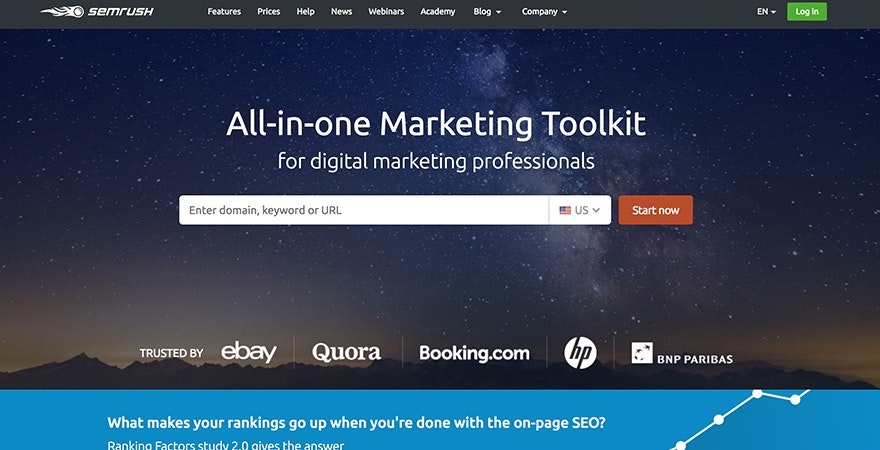
Marketing SEO tools like SEMRush tend to be fan favorites in the SEO community. Experts love that they let you easily assess your rankings as well as identify changes and new ranking opportunities. One of the most popular features of this SEO tool is the Domain Vs Domain analysis, which allows you to easily compare your website to your competitors. If you’re looking for analytics reports to help you better understand your website’s search data, traffic, or even your competitors, you’ll be able to compare keywords and domains. The On-Page SEO Checker tool allows you to easily monitor your rankings and find some recommendations on how to improve your website’s performance.

Liraz Postan, Senior SEO & Content Manager at Outbrain, recommends SEMRush as one of the best SEO tools. She says, “My favorite SEO tool is SEMrush with the feature of “organic traffic insights”. This feature lets me see all my leading articles with one dashboard, along with related keywords, social shares and word count. This gives me a quick overview of what’s working and where to optimize. I generally use SEMrush on my daily work, love this tool, and love using its site audit to optimize our site health. We improved our site health by 100% more since we started using SEMrush, and we increased conversions by 15% more from our content pages.”
4. KWFinder: SEO Keyword Tool
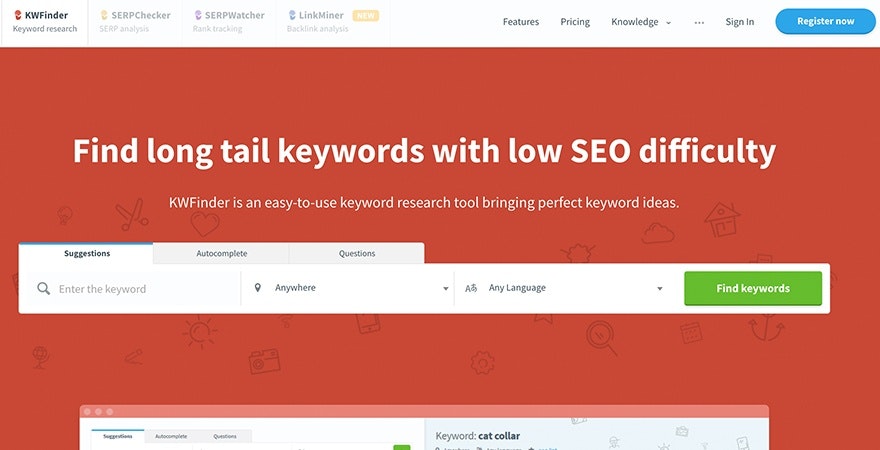
An SEO keyword tool like KWFinder helps you find long-tail keywords that have a lower level of competition. The experts use this SEO tool to find the best keywords and run analysis reports on backlinks and SERP (Search Engine Results Page). Their Rank Tracker tool helps you easily determine your ranking while tracking your improvement based on one key metric. Plus, if that’s not enough, you’ll get a ton of new keyword ideas to help you rank your website even higher.
 George Perry, an SEM Specialist at Bandwidth, raves about KWFinder. “I like that not only does it show me information on the keyword that I was searching for, but pulls in good suggestions for related terms, and how they compare (volume, CPC, difficulty, etc.) to the term I originally looked at. I’ve been able to help my clients target not only those big, pie in the sky vanity terms, but to better target those terms that are lower in the funnel and more likely to convert, allowing me to target them through focused content that answers the questions they’re actually asking.”
George Perry, an SEM Specialist at Bandwidth, raves about KWFinder. “I like that not only does it show me information on the keyword that I was searching for, but pulls in good suggestions for related terms, and how they compare (volume, CPC, difficulty, etc.) to the term I originally looked at. I’ve been able to help my clients target not only those big, pie in the sky vanity terms, but to better target those terms that are lower in the funnel and more likely to convert, allowing me to target them through focused content that answers the questions they’re actually asking.”
5. Moz Pro: SEO Software
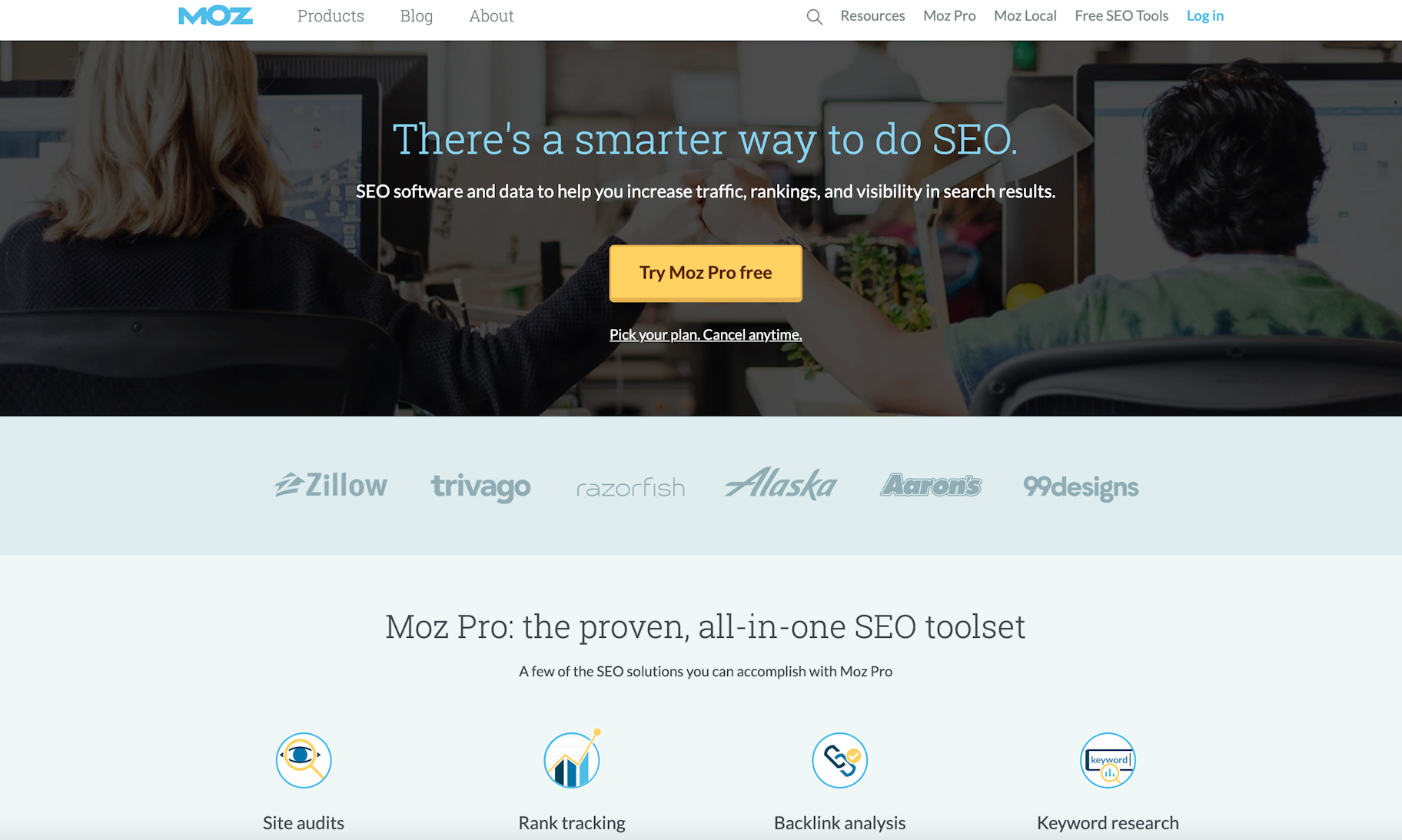
SEO software Moz Pro keeps popping up as one of the best SEO tools that experts actually use. Some specialists raved about how Moz was always up to date despite Google’s regular algorithm changes. Others praised Moz’s chat portal that allows them always to get an insightful response to every question asked. Whether you’re looking for keyword recommendations or a site crawl, Moz is a full-service powerhouse. You can get great insights into how your website is performing but also how to improve it. They also have a free MozBar toolbar that you can download to see your website’s metrics while browsing any page. If you’re looking to learn more about SEO, you should also consider checking out MozCon, their annual conference.

Keri Lindenmuth’s, Marketing Manager at Kyle David Group, go-to SEO tool is none other than Moz Pro. She says, “My favorite feature of the tool is its ‘page optimization feature.’ It tells you exactly what steps you can take to improve the SEO of every single page on your website. For example, it will tell you to ‘Include your keyword in this page title’ or ‘Add an image with a keyword alt tag.’ This tool has substantially improved our client’s business simply by the fact that it gives increased transparency. We can compare their site’s traffic and optimization to that of their competitors. We can see which pages and search terms their competitors perform well in and alter our web practices to compete against theirs. Without a tool like Moz, SEO really becomes a guessing game. You have no idea where you’re doing well and where you can use improvement.”
6. Ubersuggest: Keyword Tracking Tool
Ubersuggest, developed by Neil Patel, is a free keyword finder tool that helps you identify keywords and also the search intent behind them by showing the top ranking SERPsFrom short to long-tail phrases, you can find the right terms to use on your website with hundreds of suggestions from this free great keyword tool. Metrics Ubersuggest includes in its reports are keyword volume, competition, CPC, and seasonal trends. Great for both organic SEO and paid PPC, this tool can help you determine if a keyword is worth targeting and how competitive it is.
7. Answer The Public: Free SEO Tools

Free SEO tools like Answer The Public allow you to easily find topics to write about for your blog. I’ve used this tool in the past to create content around specific keywords to better rank online. Say you’re in the ‘fitness’ niche. You can use this free SEO tool to create content around keywords like fitness, yoga, running, Crossfit, exercise and cover the entire spectrum. It’s great for finding featured snippet opportunities. Say you hire a freelancer to create content for you, all you need to do is download this list and send it over to them. And it would only take you five minutes, making it one of the most efficient ways to come up with SEO topics for new websites.

Matt Jackson, Head of Content at Wild Shark, loves free SEO tools like AnswerThePublic. He shares, “One of my favorite tools when compiling SEO content for a site is AnswerThePublic.com. The best feature of the tool is that it presents a list of the questions that web users are asking about a particular keyword. If I’m running out of genuinely useful content ideas, or if I’m compiling an FAQ page, it provides invaluable guidance as to what, exactly, people are searching for. It is not only useful for SEO content, it means that our clients can answer questions on their site, minimizing the number of customer service calls they receive and giving greater authority to a page and the overall business. And here’s a quick tip: prevent neckache by hitting the Data button, rather than straining to read the question wheel.”
8. SpyFu: Free SEO Tools

While SpyFu has an amazing premium version, many of our experts raved about its free features. If you’re just starting out, you can easily grow into the paid features as you start succeeding. You can easily view the number of times a keyword gets searched each month while easily determining the ranking difficulty for that keyword. You can also do some research on your competitors to determine which keywords they use. Additionally, you can search your competitor’s, or your own, website to easily see how many organic keywords they have, how many monthly clicks they get, who their paid and organic competitors are, the campaigns they’re running with Google Ads, and more. It’s one of the most detailed SEO analysis tools on the market.

Adele Stewart, Senior Project Manager at Sparq Designs, can’t get enough of SEO software SpyFu. She shares, “I have used SEMrush and Agency Analytics in the past, but SpyFu has the one-up on my client’s competitors. All of SpyFu’s features are great, but my absolute favorite is the SEO Research feature. You’re able to plug in a competitor’s domain and pull up information on their own SEO strategy. You can see what keywords they pay for vs. their organic standings, review their core keywords, and even assess their keyword groups. Using SpyFu has been integral to my client’s SEO successes. There’s so much more to track and report on, plus I don’t have to put in as much effort in research as I did with other SEO software. SpyFu pulls the information I need and organizes reports in a way that is presentable and understandable to my clients. I’ve already seen increases in indexing and rank for keywords that we didn’t even think of.”
9. Woorank: SEO Ranking Tool
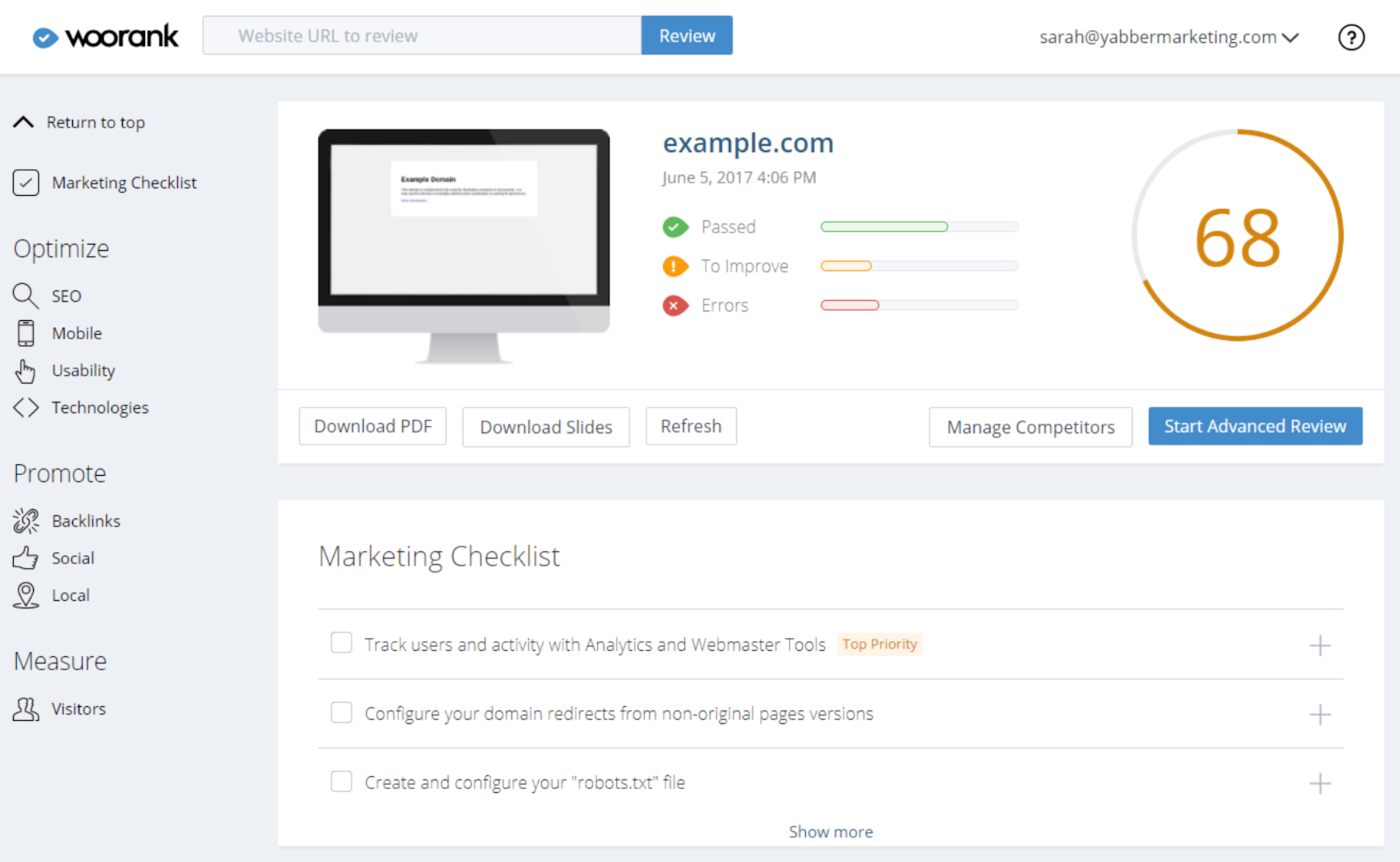
As a top SEO analysis tool, Woorank offers free and paid options to track and report your marketing data. You can plug in your competitors to discover which keywords they are targeting so you can overlap with theirs. Try understanding how keywords perform over time to optimize for users and search engines in the best way possible. And most importantly, understand the things your website is lacking from both a technical and content perspective. Woorank can help you identify duplicate content, downtime, and security issues and provide guidelines on how to fix them.
10. Majestic: Marketing SEO Tools

Majestic is one of the best marketing SEO tools according to experts. It has countless useful features like The Majestic Million which lets you see the ranking of the top million websites. Did your website make the cut? The Site Explorer feature allows you to easily see a general overview of your site and the number of backlinks you have. It also works as an SEO keyword tool to find the best keywords to target while also having features geared to site comparisons and tracking your rank.

Ryan Scollon, SEO Consultant at RyanScollon.co.uk recommends the SEO tool Majestic. He says, “My favorite SEO tool is Majestic, with its main feature allowing you to check the backlinks of a website that you specify. My favorite feature is the ability to add your own client’s site and a bunch of competitors, allowing you to easily compare a variety of SEO metrics such as trust flow, referring domain count, and external backlinks count. Not only does it help us understand the [client’s optimization] weaknesses, but it also provides a simple table that we share with our clients, so they too can understand the problems and how they stack up to their competitors. We also use Majestic to audit competitors’ backlinks, as we can sometimes find a handful of easy opportunities to tackle before moving onto other link building tactics.”
google seo tools
- Google Lighthouse
Google Lighthouse Sample Dashboard – Free Google SEO Tools
Google Lighthouse is designed to improve your website’s UX and performance. Auditing four different components, Google Lighthouse examines accessibility, Progressive Web Apps, performance, and SEO.
The results of these audits will give you a clear picture of the overall performance of your desktop site, web app, or mobile site.
Site speed is different for every user. Some people might have access to superfast 5g while others might only have unreliable 3g available. Google Lighthouse tells you exactly how each of these users will experience your site.
It will indicate if any of your web pages feel sluggish. As we all know slow or unresponsive web pages result in fewer conversions. This tool is perfect for getting your site up to speed.
Alternatives: Dareboost, WebsiteSpeedchecker.com
- Google Search Console
Google Search Console Landing Page Snippet – Free Google SEO Tools
With Google Search Console, you can identify broken links, crawling issues, see how many pages are indexed, and find out if your site has been penalised.
This is a great tool for seeing how Google views the technical elements of your site from a ranking perspective. Google Search Console will find all those blockers that are stopping your web properties from ranking well on search engines.
On top of identifying technical issues, you can also use the platform to identify the exact search queries users enter into Google to find your web pages.
Within the ‘Search Queries’ report, explore the analytics for each query, to see which pages need an SEO boost. These pages are generally those with high impressions and low CTR.
Alternatively, the platform can tell you if you might want to reconsider your keyword strategy if your site has lots of pages with low impressions and low position.
- Google Analytics
Google Analytics Sample Dashboard – Free Google SEO Tools
Once you’ve got a solid SEO strategy in place, you’ll want to know if it’s helping to bring you more organic traffic. This is where analytical tools come into play.
If you care about making page 1 on Google search results, it’s best to stick to Google Analytics which uses all of its own data.
Other analytical tools usually just piggyback off Google’s data anyway, so you may as well use Google Analytics which is both free and accurate – a win-win situation.
Google Analytics tracks every minute piece of data related to your site’s visitors and traffic. Uncover keyword insights to find which search terms people use to land on your page so you know which elements of your keyword strategy are working.
Carrying out a successful and thorough SEO strategy is challenging if not impossible without performing regular analysis of your site. To stay ahead of the curve and competition, use Google Analytics to help you formulate a successful SEO strategy.
Alternatives: Matomo, FoxMetrics
- Google Data Studio
Google Data Studio Sample Dashboard – Free Google SEO Tools
Find Google Analytics and its vast data overwhelming? Google Data Studio is a free data visualisation tool which presents the data in visual, easy to read reports, and dashboards to help you interpret all the relevant information correctly.
View graphics like colour-coded maps showing the top countries by sessions or graphs to show you how site sessions are trending.
It integrates with other SEO tools from Google, such as Google Search Console to ensure your reports are as detailed as possible.
- Google Keyword Planner
Google Keyword Planner Landing Page Snippet – Free Google SEO Tools
When it comes to putting together a strong keyword strategy, you’ll need a clear idea of some essential stats to guide your strategy.
While Google Adwords Keyword Planner was originally designed for PPC, it’s still an excellent Google SEO tool for harnessing keyword data for increasing your organic traffic.
Enter a seed keyword and find out the monthly search volume, competition and up to 300 suggested keywords. Using these metrics, you’ll quickly find out which keywords are better to include and which you can leave out.
It’s also easy to export and save data so you can easily refer back to the keywords when you’re planning your content strategy.
While this Google SEO tool provides plenty of essential keyword metrics, don’t confuse it with being the best or most varied keyword generator. You’ll be better off with more specific keyword research tools.
- Google My Business
Google My Business Landing Page Snippet – Free Google SEO Tools
Google My Business is a pretty essential SEO tool if you run a local business with area-specific services or products.
This Google SEO tool allows you to claim your business on Google Maps so potential customers can easily find and locate your business.
Once you’ve claimed your business and it’s appearing on Google Maps, you can add photos and offers to your profile to draw in your target audience.
Google My Business basically gives you control over how you want your business to appear in its listing after appearing in a search.
The set up also allows you to add multiple ways for potential customers to contact you by messaging or calling your business directly.
Relevant statistics give you an accurate indication of how your customers connect with the business. View the total number of searches for your business, the number of calls and how many views your business received.
- Google Alerts
Google Alerts showing search results for “my brand” – Free Google SEO Tools
Want to know any time someone mentions you or your business online? Or do you want to spy on your competitors’ mentions?
Google Alerts is a pretty simple tool to use. Anytime there’s a mention of the exact phrase you want alerts for, Google sends you an alert via email.
While it’s nice to know when you or your business receive a mention, it’s actually essential information when it comes to identifying link building opportunities, or potential brand collaborations. You can use your competitors’ mentions to help guide your strategy.
Alternatives: Mention, Ahrefs Alerts
- Tag Manager
Google Tag Manager Landing Page Snippet – Free Google SEO Tools
Waiting around for website updates and long development timelines is undoubtedly frustrating.
Google Tag Manager is a tool that allows you to easily update measurement codes and related code fragments known as tags on your website or app meaning you don’t need to rely on a web developer to do it for you which will ultimately save you time and your marketing budget.
As a more advanced technical Google SEO tool, it can take some time to get your head around some of the concepts. However, once code is installed on your site, you can then edit lots of the common marketing tags without further code updates.
- Google Mobile-Friendly Test
Google Mobile-Friendly Test Landing Page Snippet – Free Google SEO Tools
Having a mobile optimised site is essential for ensuring you reach more customers quickly. A clear, easy to use and mobile-friendly site will ensure your site looks up to date and relevant. If your site is easy to navigate on a smartphone, it will increase customer satisfaction resulting in higher traffic and more conversions.
This tool tests how easily a user can access and navigate your site’s pages from a mobile device. One essential step is to ensure all web pages look good in a vertical format. There should also be larger CTA buttons so that users can take the action they want to without clicking elsewhere by accident.
These aesthetic and navigation issues are all features the platform will analyse to ensure your users are having the best possible mobile experience.
It will also dive deep into technical issues like text that’s too small or plugins that don’t work to ensure your whole site is compatible with a mobile browser.
- Google Trends
Google Trends Sample Dashboard – Free Google SEO Tools
Google Trends is a useful tool for comparing popular search terms over a given time.
View whether a trend is increasing or declining in popularity. This data is especially useful for showing seasonal variations in search popularity.
If you’re in eCommerce or shipping this can be helpful for understanding the seasonal popularity of items. For example, if you sell sunglasses, you’ll be able to see during which months there’s a spike in popularity and when in others there’s a dip.
You can also use this data to inform when you might want to revamp old content that needs a refresh or when you want to increase your output of original content around seasonal trends.
Having access to this data is key for planning when you might want to run PPC, invest more in your SEO strategy or spend time planning your content strategy.
Conclusion
Let us know your thoughts in the comment section below.
Check out other publications to gain access to more digital resources if you are just starting out with Flux Resource.
Also contact us today to optimize your business(s)/Brand(s) for Search Engines
